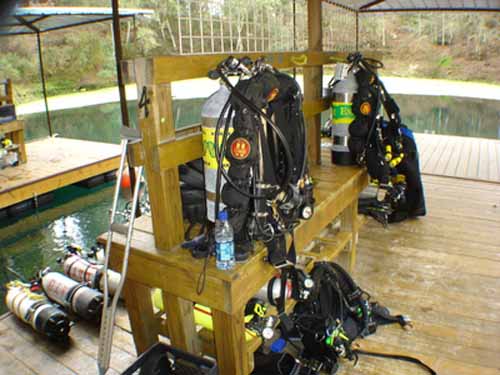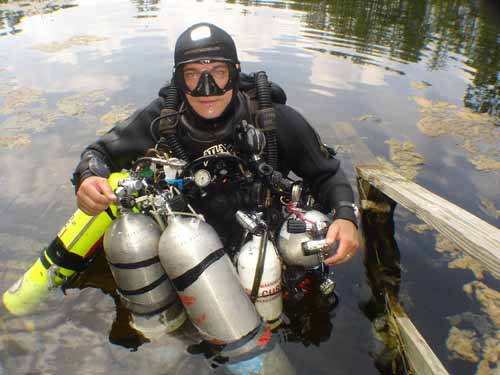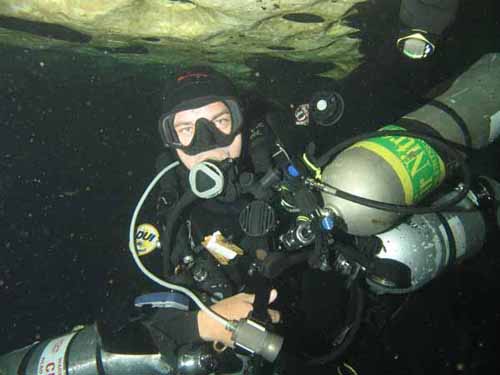|
|
Advanced Trimix Diver - Technical Divers
The TDI Advanced Trimix course provides the training and experience required to safely and competently use breathing gasses containing helium for dives that require staged decompression, utilizing nitrox and/or oxygen mixtures during decompression to a maximum depth of 300 feet (100 meters). The objective of this course is to train divers in the benefits, hazards and proper procedures of utilizing custom oxygen / helium / nitrogen mixtures as breathing gases.
This course builds on the fundamental knowledge base developed throughout the Normoxic Trimix course. One of the major limiting factors of going deeper is narcosis and risk of oxygen toxicity; TDI’s Advanced Trimix Diver course shows how to minimize the effects of narcosis by adding helium to offset the nitrogen in your breathing gas. This course is for students that wish to plan for safer, deeper dives with reduced risk of nitrogen narcosis and oxygen toxicity.
As with all the courses in the TDI training program, the Advanced Trimix course will add more knowledge and a variety skills to your diving repertoire leaving students more qualified and confident to undertake more challenging and adventurous dives. The TDI Advanced Trimix Diver course is the pinnacle, top level of training for open circuit divers.
This course is commonly taken with the TDI Advanced Gas Blender Course.
Agencies we teach for:
TDI and IANTD
Course Cost:
See Prices Page
This includes your TDI Advanced Trimix study guide, your dive training, a certification card and photos (above and below water).
Other costs:
What not included is gear hire, gas fills, food, lodging, dive site fees & transportation. Dive site fees range from $15-$40, depending on site. Often we visit the ocean to get our required depth for dives, and charters range from $60-$100 per person. We use a mix of helium, nitrox and oxygen as breathing gases during the Advanced Trimix Course, which cost more than air.
Gear you need to provide:
You will need to own your own scuba gear:
* Low volume mask and appropriate fins
* Bottom Mix Cylinders: All students MUST utilize a double tank system, either backmounted doubles or sidemount tanks, and equipped with DIN valves. Whatever volume tanks are chosen, they must supply sufficient gas to complete class dives. To sign up for this course you need to already be comfortable and proficient diving in a dual tank system. These tanks must be properly labeled as required for EANx mixtures, and equipped with 2 appropriate regulators (must be high performance, and serviced within the last year).
* Decompression Mix Cylinder(s) which should contain a minimum of 1.5 times the gas required for the planned decompression. Decompression cylinder must be labeled in accordance with TDI Standards, and have an appropriate regulator(s).
* Travel Mix Cylinders which should contain appropriate gas volume for the planned dive. Travel mix cylinder must be labeled in accordance with TDI Standards, and have an appropriate regulator.
* Back plate and wing setup (with sufficient lift to manage tanks)
* Depth gauge and automatic bottom timer and/or dive computer
* BCD with power inflator
* Exposure suit adequate for the dive environment (dry suit highly recommended)
* Dive tables or computer planning software, and appropriate redundancy.
* 2 line cutting devices (recommended is a Z knife, to be arm or chest mounted).
* Slate or wetnotes with pencil
* Liftbag (min 50lb lift, dump valve highly recommended)and appropriate length reel/spool
* Redundant light system if needed for site conditions.
What the course entails:
The TDI Advanced Trimix course, as mentioned previously, is the pinnacle of training in the open circuit dive community. This course is a course like no other, and will pose challenges and excitement, while calling on all your previously learnt skills, knowledge and experience. Mixed gas diving, like all decompression diving, results in a ‘virtual overhead’ environment, thus requiring special techniques, redundant equipment and a proper attitude to participate in this kind of diving.
By the time you enroll in this course you should be extremely familiar with both the physics and physiology of diving. This course reviews these subjects, and further enhances the role that helium plays in safe diving practices. You will be expected to learn techniques of multiple gas use, solve simple math problems and be responsible for your physical fitness and mental preparedness.
Essentially the Advanced Trimix Diver course teaches students how to minimize the effect of narcosis and risk of oxygen toxicity by adding helium to their mix, to custom a blend appropriate for the planned depth.
How we teach it:
There are two parts, the academics and the "wet" portion.
Academics
The academics are done mostly at home from your TDI Advanced Trimix Study Guide. This guide is very well structured, a very informative learning tool, and an excellent alternative to multiple day or evening lectures. Some topics covered are:
* Physics
* Physiology
* Decompression options
* Equipment considerations
* Dive tables vs computer generated tables
* Dive planning, and emergency planning and procedures
When you meet with your Instructor he/she will review the academics and you will complete a written test. You need to achieve at least 80% on your written test to pass. Detailed dive briefings and land drills will precede the diving.
Land Drills
* Selection and preparation of equipment suitable for soft overhead environments and long decompression requirements.

* Demonstrate familiarity with basic and technical hand signals, gas switching procedures, gas matching among team members
* Properly analyze all gas mixtures to be used
* Demonstrate adequate pre-dive planning using limits based on personal gas consumption, oxygen exposures at planned depth with actual mix for decompression profiles.
Wet Training
For the wet training, we typically do two days in the water: at least 4 dives, with a minimum accumulated bottom time of 100 minutes. At least two of the dives should be deeper than 230 feet (70m). During these dives we complete a variety of skills such as:
* Demonstrate buoyancy control (ability to hover at fixed position in water column without moving hands or feet) at all times.
* Demonstrate excellent gas management
* Demonstrate competence managing three stage cylinders (either three deco gas or two deco and extra bottom/travel gas), including drop and recovery, and show comfort swimming at the surface and at depth carrying decompression stage cylinders.
* Show good awareness of buddy and other team members through communications, proximity and team oriented dive practices
* Conduct appropriate decompression stops while maintaining neutral buoyancy
* Conduct team oriented and solo drills for lift bag deployment
* Demonstrate ability to share air with a buddy as both recipient and donor in a controlled manner while maintaining position in water column.
* Throughout all dives demonstrate mature, sound judgment concerning dive planning and execution.
* Properly execute the planned dive within all pre-determined limits.
* Demonstrate appropriate modifications to decompression schedule for emergency purposes, and an ability to manage multiple failures in adverse situations.
Note: this is not a fully inclusive list, just an overview!
Planning and flawlessly executing dives is a skill that students must demonstrate during their Advanced Trimix Course
All dives will include a pre-dive briefing, START check, safety stop and post dive critique.
START is an acronym for pre dive checks as follows: S-Drill (OOA drill and Bubble Check), Team (buddy equipment checks), Air (gas matching), Route (entry/exit and planned path underwater), Tables (depth, duration, waypoints and schedule).
It should be noted that participation in the Advanced Trimix class does not guarantee certification. Each student must do the required number of dives, all the skills, and demonstrate that they are comfortable with planning and executing safe dives utilizing multiple gasses before they receive their certification card.
After successful completion of your academics and water work, you will be awarded your certification as an Advanced Trimix Diver.
Here at Dayo Scuba we also "mentor" our students (at no extra cost), so you can also gain additional experience in this type of diving with us after your have completed your course.

Age requirements:
You must be at least 18 years old to receive a Advanced Trimix certification, there is no maximum age.
Minimum number of students per class:
We need 2 or more people to make a Advanced Trimix class; private, one-on-one classes can be organized for a separate fee.
How many people are in each class?
Our Advanced Trimix classes range in size, from 1-3 students (3 is the maximum per instructor).
Schedule/Timing for Advanced Trimix Courses:
We train all the time, and have multiple instructors on staff, many full time, so we do weekday and weekend classes.
Call us or check out our Calendar for dates of upcoming courses.
How long does the course take?
Usually we complete the wet portion of the Advanced Trimix course in 2 days, with at least four dives. Sometimes it is necessary to be in the water more than 2 days because of learning difficulties or weather issues. If necessary, you can come back, free of charge, and join in another Advanced Trimix Course to finish your training. We will also train you for any extra days you may need to get you properly certified. It is our mission to make you a safe and competent diver.
Where we do our course:
We usually do our Advanced Trimix training here around Central Florida or in North Florida. We try to dive two different sites for the deco course, day one is usually a basic site, and day two is more advanced site. Common choices for training are Forty Fathoms Grotto and the ocean. If you are cave trained, we have a lot more sites to choose from.

Prerequisites for Course:
* You must be Normoxic Trimix certified
* Minimum age: 18 years old
* Minimum of 100 logged open water dives, with 25 deeper than 100 feet (30 meters)
* Before participating in the TDI Advanced Trimix course, you will be asked to fill out a standard liability release form and a medical statement. If you answer YES to anything on the medical form we will require that you get it signed off by a physician
* is required for all technical dive courses is required for all technical dive courses
* This class requires that all student divers already have excellent buoyancy skills. Do NOT take this class if you have none
What you can do afterwards:
For many divers, this course will open up a large number of dives previously beyond the scope of their training. The course leaves you qualified to go out and perform staged decompression dives, (using helium based mixtures) up to a depth of 300 feet!
* You can dive for longer and deeper!
* There are plenty of skills introduced on the course to go out and practice and refine
* You will be a safer, more competent and comfortable diver after completion of your Advanced Trimix course…..knowing you are a better diver, that now has the ability to multi-task while diving
* The safe diving practices learned during your Advanced Trimix course will apply to all types of diving you do in the future, including open water recreational diving
Prices
|
|
|